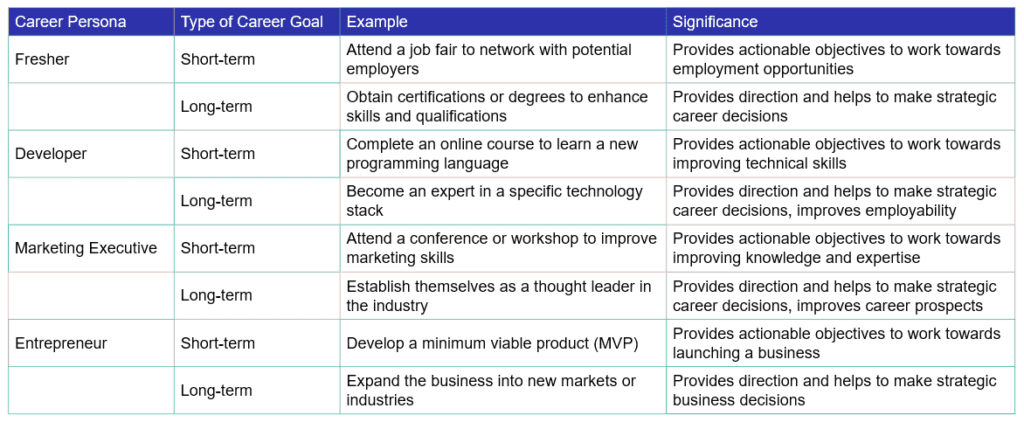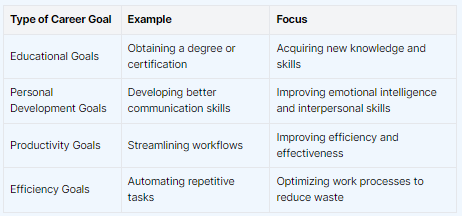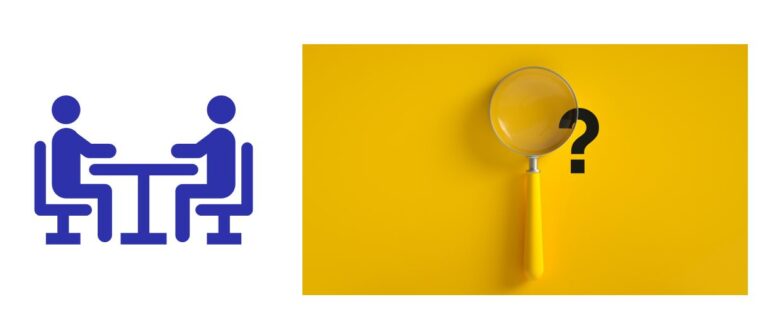How to Answer “What are Your Goals?” During a Job Interview + 10 Powerful Examples
About the author: Ilam’s career in Technology and Financial Services spans more than two decades, characterized by leadership roles and vast international experience. He has managed large global teams, worked across five countries, and engaged with colleagues from over 100 nationalities. Through this blog covering executive interview questions, Ilam shares his diverse experiences and insights, aiming to contribute to and enrich the community.

Key takeaways from this post: How to answer ‘What are Your Goals’
- Understanding the Importance: Hiring managers may ask about career goals to assess your alignment with the role and company, as well as your long-term commitment. It is crucial to have a reasonably well-defined career goals to maintain focus and motivation in your professional life.
- Differentiating Short-term and Long-term Goals: Differentiating between short-term and long-term career goals is essential. Short-term goals are specific, actionable objectives to achieve within the next six to twelve months, while long-term goals are broader aspirations to accomplish over the next few years.
- Types of Career Goals: Career goals can be categorized into four types: professional advancement (improving work performance and climbing the ladder), leadership advancement (improving management skills and aiming for higher positions), educational advancement (continuous learning and staying up-to-date in your field), and personal development (improving soft skills like communication and networking).
- Preparing an Effective Answer: To prepare a targeted answer, it is essential to research the company and position you are applying for. Tailor your response to align with the company’s goals and showcase how your skills and experience support your career aspirations.
- Example Answers: The blog provides sample answers for different scenarios, such as students/interns, professionals, and management. These examples illustrate how to structure your response, starting with short-term goals and transitioning to long-term ones, while backing them with action plans and emphasizing how they benefit the employer. Practice and refine your answer to deliver a clear and confident response during the interview.
Job interviews can be nerve-wracking, and it’s essential to prepare for possible questions that hiring managers may ask. One interview question that is commonly asked is “what are your goals?” or variations of it. Sharing your aspirations can help the interviewer understand if your career goals align with the role and company, making it crucial to have an impactful answer.
In this blog post, we’ll discuss why a hiring manager may ask about career goals and how to differentiate between short-term and long-term career goals. We’ll also explore the different types of career goals and provide tips on how to prepare a targeted answer. Additionally, we’ll share some example answers to help you answer this interview question effectively. So, let’s get started!
Here are some helpful job interview related blogs
- Tackling the final interview round
- How to answer ‘tell me about yourself’
- What are your career aspirations
- Why do you want this job
- Why should we hire you
- Why are you leaving your job
- What are you passionate about
- Strengths and Weaknesses In Interview
- Interview questions for managers
- What is your management style
- Interview questions for freshers
- Tips to succeed in a job interview
- Types of interview questions
- Interview questions to ask candidates
- Behavioural interview questions
- Walk me through your resume
- What makes you unique
- What are your goals
- How do you handle stress and pressure
- Are you a team player
- How did you hear about this position
- Where do you see yourself in five years
- How do you handle stakeholders
Why Interviewers Ask ‘What Are Your Goals?’
There are several reasons why interviewers ask about career goals. First, they want to know if you have a long-term commitment to the job and the company. Hiring managers seek employees who will stay with the company for a long time and grow within the organization. By asking about your career goals, they can assess if your plans align with the long-term goals of the company and if you’re a good fit for the role.
Second, interviewers want to understand your motivation, growth potential, and progression in the workplace. Sharing your career goals shows that you have a plan for your future and are committed to professional development.
Finally, the interviewer also wants to see if you’ve done your research on the company and the role you’re applying for. Answering the question effectively demonstrates that you have a good understanding of what the company does, what its values are, and how the role fits into the company’s bigger picture.
Examples of Other Similar Questions That Interviewers May Ask
In addition to “what are your career goals?”, interviewers may ask similar questions such as:
- Where do you see yourself in five years?
- What are your long-term aspirations?
By asking these questions, interviewers can gain a better understanding of your career plans and how you see yourself fitting into the company’s long-term objectives.
In the next sections, we’ll explore the different types of career goals you may have and how to differentiate between short-term and long-term goals.
Differentiating Between Long-term and Short-term Career Goals
It’s important to differentiate between long-term and short-term career goals as they help you prioritize your career aspirations and give you direction on the path you should take. Long-term goals are broad achievements that you aim to accomplish over an extended period, usually five to ten years. On the other hand, short-term goals are specific and measurable objectives that you can accomplish within a year or less.
Why is it important to differentiate between long-term and short-term career goals?
Differentiating between long-term and short-term career goals can help you focus on what’s essential for your career development and keep you motivated. Short-term goals give you a sense of accomplishment and progress and help you build momentum towards achieving your long-term goals. Long-term goals provide you with a clear vision of where you want to be in your career and the path you need to take to get there.
Examples of both types of career goals and their significance in career development
Long-term career goals are significant because they provide you with direction and purpose. For example, if your long-term goal is to become an expert in your field, you’ll know the skills you need to develop, the certifications you should obtain and the jobs you should take to achieve that goal. This focus can help you make strategic career decisions that align with your long-term aspirations.
Short-term career goals are significant because they give you specific actionable objectives to work towards your long-term goals. For example, attending a conference or workshop to learn new skills can help you improve your knowledge and expertise in your field, making you more competitive and valuable to your employer. Short-term goals provide you with a sense of accomplishment and progress, which can help you stay motivated along the way.

These are just a few examples, but they illustrate how identifying long-term and short-term goals can provide direction and focus for different career personas. By setting and achieving actionable short-term goals, individuals can stay motivated and build momentum towards achieving their long-term aspirations. Additionally, having clear long-term goals can help individuals make strategic decisions that align with their career aspirations.
In summary, differentiating between long-term and short-term career goals is critical for career development. Both types of goals serve different purposes, and by identifying your long-term goals and creating actionable short-term goals, you can stay focused and motivated on the path to achieving your career aspirations.
Types of Career Goals
When considering your career goals, it’s essential to identify the different types of goals you may have. By categorizing your goals, you can create a well-rounded plan that covers various aspects of your career development. Here are four categories of career goals to consider:
1. Educational Goals
Educational goals focus on acquiring new knowledge, skills, and qualifications. These goals may include obtaining a degree or certification, attending training programs or workshops, or learning new skills through online courses. By improving your education and skills, you can become more competitive in the job market and increase your chances of career advancement.
2. Personal Development Goals
Personal development goals focus on improving your emotional intelligence, self-awareness, and interpersonal skills. These goals may include developing better communication skills, learning how to manage stress, or enhancing your leadership skills. Personal development goals can help you become a more well-rounded professional and improve your overall quality of life.
3. Productivity Goals
Productivity goals focus on improving your efficiency and effectiveness at work. These goals may include reducing the time it takes to complete tasks, streamlining workflows, or improving your project management skills. By becoming more productive, you can increase your output and take on more responsibilities, which can lead to career advancement.
4. Efficiency Goals
Efficiency goals focus on optimizing your work processes to maximize output while minimizing effort and resources. These goals may include automating repetitive tasks, delegating tasks to others, or finding ways to reduce costs and waste. By becoming more efficient, you can save time and money, which can improve your bottom line and help you stand out as a valuable employee.
Importance of Having a Mix of Different Types of Career Goals
Having a mix of different types of career goals can help you become a well-rounded professional and avoid stagnation in your career. Educational goals can help you acquire new skills and knowledge, while personal development goals can help you improve your emotional intelligence and interpersonal skills.
Productivity goals can help you become more efficient and effective at work, while efficiency goals can help you optimize your work processes and reduce waste.
By identifying the different types of career goals you have and creating a plan that covers each category, you can ensure that you’re always progressing and improving in your career. Additionally, having a mix of goals can make your work more fulfilling and enjoyable, as it provides a variety of opportunities for growth and development.
Here is an example table to summarize the four categories of career goals:

How to Prepare an Impactful Answer
When preparing for a job interview, one of the most critical aspects is the ability to articulate your career aspirations and professional goals effectively. In this section, we’ll outline steps to follow when preparing an impactful answer that highlights your strengths and aspirations.
A. Identifying Your Professional Goals
Before you can prepare an effective answer, you need to identify your professional goals. Knowing what you want out of your career can help you tailor your answer to the specific position and company you’re applying for. Here are some tips to help you identify your professional goals:
- Reflect on your career path so far and what you enjoyed or disliked about previous roles.
- Consider what motivates you in your work and what you want to achieve in the future.
- Identify skills and experiences you want to acquire and develop in your career.
B. Researching the Company and Position
To prepare an answer that aligns with the company’s values and goals, it’s essential to research the company and the position you’re applying for. Here are some tips on how to research the company and position:
- Read the company’s website, mission statement, and values to understand its culture and goals.
- Research recent news articles about the company and any recent initiatives or projects they’re working on.
- Review the job description to understand the skills and experience required for the position.
C. Preparing a Relevant, Career-focused Answer
Once you’ve identified your professional goals and researched the company and position, you can begin to prepare an impactful answer that highlights your strengths and aspirations. Here are some strategies to help you prepare a relevant, career-focused answer:
- Use the STAR method (Situation, Task, Action, Result) to structure your answer and provide specific examples of how you’ve demonstrated your skills in the past.
- Emphasize how your skills and experience align with the company’s goals and values.
- Be concise and to the point, focusing on the most relevant aspects of your career aspirations and professional goals.
D. Giving a Broad but Concise Answer
Finally, it’s essential to give a broad but concise answer that covers the most critical aspects of your career aspirations while remaining relevant to the specific position and company you’re applying for. Here are some tips on how to give a broad but concise answer:
- Use specific examples and anecdotes to illustrate your points.
- Focus on the most critical aspects of your professional goals that align with the position and company.
- Practice your answer to ensure that you can deliver it confidently and concisely during the interview.
By following these steps, you can prepare an impactful answer that highlights your strengths and aspirations, and demonstrates your suitability for the position and company you’re applying for.
Example Answers to ‘What Are Your Career Goals?’
Use the sample answers in this section for inspiration only. A good hiring manager will easily smell an insincere or a copy/paste response quickly. You cannot just google answer examples and come across authentic. If you start with a lie, you cannot answer follow up questions.
Fresh Graduate with a Focus on Professional Advancement (or) Leadership advancement
“As a fresh graduate, I don’t have specific future career goals as I’m too new. However, I expect to move in the direction of gaining experience and grow professionally in my chosen field. I want to work in a company where I can learn and develop new skills while contributing to the success of the organization. In the future, I hope to take on leadership roles and become an expert in my field.”
Marketing Executive with a Focus on Leadership (or) management position
“As a marketing executive, my career goal is to become a leader in my field. I aim to develop my leadership skills and guide my team towards achieving our marketing goals. I also want to stay up-to-date with industry trends and innovations to bring new ideas to the table.”
Customer Service Representative with a Focus on Personal Growth (or) Educational advancement
“My career goal as a customer service representative is to continue growing both personally and professionally. I aim to build on my current skill set and acquire new ones that will allow me to provide better service to customers. I also want to take on more complex challenges and responsibilities.”
Software Developer with a Focus on Entrepreneurship
“As a software developer, my career goal is to start my own tech company (or) own business in the future. I believe this will allow me to bring innovative ideas to life and make a meaningful impact in the industry. In the meantime, I want to continue building my technical skills and expertise.”
Accountant with a Focus on Work-Life Balance
“As an accountant, my career goal is to find a job that allows me to balance my professional life and personal life. I want to be able to pursue my hobbies and interests outside of work while still making meaningful contributions to the company. In the future, I hope to become a mentor to younger accountants and help them grow in their careers.”
Sales Manager with a Focus on Social Responsibility
“My career goal as a sales manager is to work for a company that prioritizes social responsibility and sustainability. I believe this will allow me to make a positive impact in the world while also advancing in my career. I want to lead successful sales teams that are making a difference in society.”
HR Professional with a Focus on Innovation
“As an HR professional, my career goal is to work for a company that values innovation and creativity. I want to be part of a team that is pushing boundaries and solving complex problems. In the future, I hope to become an HR director and guide the company towards success.”
Graphic Designer with a Focus on Customer Service
“My career goal as a graphic designer is to provide excellent customer service and build long-lasting relationships with clients. I aim to create designs that meet their needs and exceed their expectations. I also want to continue developing my design skills and stay up-to-date with new technologies.”
Project Manager with a Focus on Teamwork
“As a project manager, my career goal is to become an effective leader and collaborate successfully with my team members. I want to ensure that everyone is working towards the same goals and that we’re delivering successful projects on time and within budget. In the future, I hope to take on more complex projects and become a mentor to other project managers.”
Business Analyst with a Focus on Education
“As a business analyst, my career goal is to pursue higher education in my field and become an expert in data analysis. I believe this will not only enhance my knowledge but also help me better serve the company. In the future, I hope to become a consultant and guide companies towards success.”
Here are some helpful career/leadership related blogs
- Careers– Agile Coach, RTE, Product Owner, Scrum Master, QA Manager
- Career development plan
- Career growth
- Project Management
- Managing Managers
- IT Career switch
- Software Engineering career path
- Agility, Agile Testing
- Remote leadership / Leadership traits / Agile leadership
Other Productivity / Tools posts that may interest you
- Productivity
- Book summary apps – Headway App vs Blinkist vs getAbstract
- AI Writers: / Blogging – Jasper, Writesonic, Article Forge , Copy AI, Anyword, Writecream, Copymatic, Quillbot, Peppertype, Jasper AI (pricing) &
- Work From Home tools: Jabra
Author also writes at his Medium site.





